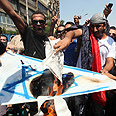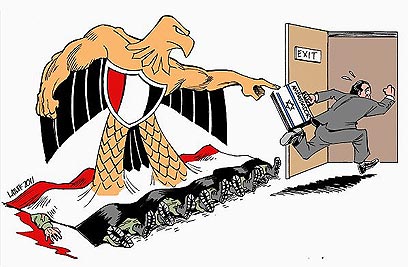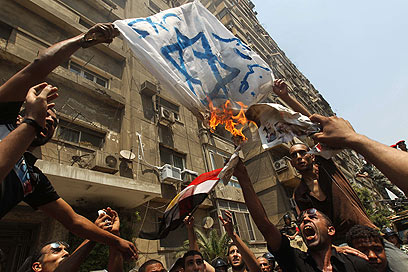


An editorial in the London-based Al-sharq al-Awsat claimed Sunday that the multifocal terror attack near Eilat is a result of Syrian President Bashar Assad's attempt to divert attention from the uprising in his country and reduce international pressure on him and his regime.
More on the tensions with Egypt:
- Egyptian 'hero' for removing Israeli flag
- Egypt: Israeli apology 'insufficient'
- 'Egyptian army shoots to kill'
- Op-ed/ New rules of the game in the south
"It is clear that Egypt, in their response to Israeli aggression in Sinai, has forgotten or have failed to listen to the declarations made by President Bashar Assad's confidant and cousin Rami Makhlouf, as the Syrian uprising gained strength," noted Tarek al-Hamid in his column on Sunday.
According to Tarek, in an interview given to the New York Times last May, Makhlouf stressed that “If there is no stability here (Syria), there’s no way there will be stability in Israel.” In the same interview Assad's cousin said, "Don’t let us suffer, don’t put a lot of pressure on the president, don’t push Syria to do anything it is not happy to do.”
"And what happened?" wondered Hamid in his article, "Assad's regime sends the Palestinians to the border with Israel in the Golan (i.e: The "Naksa" and "Nakba" Day events) but his plan failed, the Palestinians were killed and Israel sent a clear message to Assad.
"Then the Syrian government made another attempt – to pressure Israel through Syrian recognition of the 1967 borders while constantly sending messages to the US claiming that Assad hopes to promote peace. Then, with Iranian assistance came the attempt in Gaza and Sinai to relieve Assad's weary regime."
Diplomatic discord
The Foreign Ministry predicted Saturday that the burgeoning crisis with Egypt would dissipate after Israel offered its apologies over the deaths of the five Egyptian officers. Egypt also made an official statement declaring the apology a "positive" step.Yet other voices have also been heard in the country – Egypt's opposition parties were quick to express their displeasure with Israel's efforts, some going so far as to demand that Egypt's ambassador in Israel be recalled to Cairo and Israel's ambassador to Cairo be expelled from their country.
Over the weekend Egypt made clear that an official apology from Israel was expected, with various reports claiming the country would in fact recall its ambassador. The New York Times quoted one western diplomat as saying that fears for joint diplomatic ties with Egypt led officials from other countries to intervene in the crisis and attempt to reconcile the two sides.
Making the official apology on Saturday, Defense Minister Ehud Barak said: “We regret the deaths of members of the Egyptian security forces during the terror attack on the Israeli-Egyptian border.”
Barak added that he had ordered the IDF to undertake an investigation followed by a joint inquiry with Egypt's army to look into the death of five Egyptian border guard police officers.
Reflection of changes in Egypt
"The appropriate conclusions shall be drawn in line with the inquiry's findings," the defense minister said. While Egyptian officials accuse the IDF of killing the Egyptian troops during the battle against the terrorists, Israeli military officials have not yet ascertained the circumstance of the incident.
According to Mohamed Bassiouni, former Egyptian ambassador to Israel, the Egyptian response to the incident reflects the changes that have taken place in Egypt since the January 25th revolution as well as the Higher Military Council's aspirations and the presidential candidates' attempts to strengthen their power base.
Speaking to the New York Times, Bassiouni added: “The Egyptians do not accept what has happened, and it means that Israel should take care. If they continue their behavior toward the Palestinians and the peace process, it means that the situation will escalate more.”
Yet Bassiouni also made it clear that Egypt would not call back its current ambassador. In an interview to the Cairo Today TV show Basyuni explained "in my estimation there was no breach of agreement with Israel.
"Israel expressed sorrow. We requested an apology and the establishment of a joint committee and Israel agreed."
"Before we cut off our ties with Israel we must see the benefits they have offered Egypt. Egypt and Israel will enter a circle of military violence and the borders will remain in a state of constant unrest if ties with Israel are severed," he added.
Meanwhile, dissenting voices were also heard on the Israeli side of the border, where some among Israel's security forces expressed their resentment over Egypt's demand that Israel take responsibility for the deaths of the Egyptian officers.
The soldiers noted that the terrorists who killed the officers crossed the border from Sinai and even warned the Egyptian officers in advance. "It feels like this whole thing should not have happened," one Israeli soldier noted.
"Now we are forced to take the blame as if we were responsible for the incident, even though it originated in Egypt."
- Receive Ynetnews updates
directly to your desktop
- Follow Ynetnews on Facebook


















